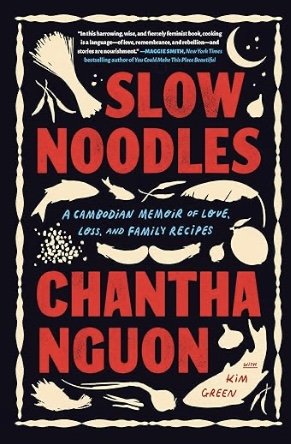Slow Noodles: A Cambodian Memoir of Love, Loss, and Family Recipes by Chantha Nguon, with Kim Green (Algonquin Books of Chapel Hill)
Even when she was very small, Chantha Nguon knew the difference between noodles. Instant noodles came in packages and “tasted careless.” Kuy teav noodles, made from wheat flour mixed with eggs, were sold in the Battambang market every day, available to anyone who had the money to buy them. But best of all were her mother’s noodles, hand-rolled into perfect cylinders that took hours to prepare. Slow noodles, she learned as a little girl, are the best and will provide her with an enduring “philosophy for life.” Care and practice, with no shortcuts, make daily living rich and flavorful.
A child with a “puppy nose for food,” Chantha knows what happiness smells like: “cloves, cracked pepper, and pate de foie.” Her mother was a beauty who knew looks weren’t enough. She augmented the gift of her appearance with extravagant meals that took lots of money and time to prepare. Her cooking was a kind of magical theatre production that entranced her little daughter and the memories of that food would shape Chantha’s future.
Cambodia swiftly transforms from “a little girl’s heaven” into a place of turmoil and tragedy. The U.S.-backed government headed by Lon Nol turns against anyone with Vietnamese blood and Chantha’s mother is Vietnamese. She sends her children to Saigon to live in the safety of relatives there. But in that portion of Southeast Asia there is no safety. Cambodia becomes locked in the horror of “Pol Pot time” and Saigon becomes Ho Chi Minh City.
Poverty sweeps over both countries in terrible ways. Chantha’s mother escapes from Cambodia to be with her children, and then witnesses their deaths. Chantha is the only child to stay alive—and then her mother dies.
Chantha has never learned how to be frugal. At one point in her life when her mother made a living as a seamstress, wooden clogs in different colors became the girl’s obsession and she used her pocket money to buy forty or fifty pairs. “I should use those as firewood,” her mother teased her. Later, alone after her mother’s death, Chantha burns them all, one by one, as fuel for cooking rice.
As she struggles to stay alive, a fortune teller predicts she will become even more poverty-stricken in the future but “sewing and cooking will save you….You will take care of yourself.”
The story of her survival and her return to Cambodia with the man whom she would marry is an adventure that tears at the heart, but this isn’t the driving force of Slow Noodles. The theme that prevails is how a country was deprived of its history, with its future jeopardized by Pol Pot’s Communist Party of Kampuchea. Trying to blot out over a thousand years of culture, this government erased “education, medicine, cinema, books, money, cars and religion” by killing anyone “whose job it was to plan for tomorrow: doctors, engineers, teachers, scientists.” “Estimates range from 1.6 to 1 million dead, from one-fifth to more than a quarter of the population.” What was left in the aftermath was “a country with no idea of tomorrow.”
Slow Noodles is a metaphor as well as a cherished culinary memory. Time, patience, persistence, and care are essential for the cooking of this dish and for the recovery of a traumatized nation. Chantha Nguon shows how this is possible to accomplish in a book that celebrates the importance of food in rebuilding a culture and revitalizing a country, while generously offering traditional Khmer recipes to replicate in any kitchen.~Janet Brown
